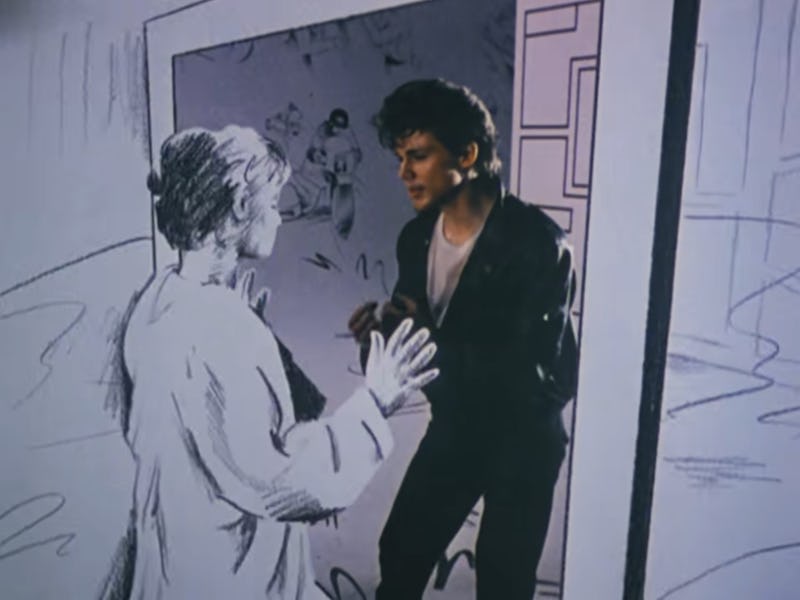You need to play the game inspired by A-ha's “Take On Me” on Nintendo Switch ASAP
I'll be coming for your love, okay?

It’s amazing what a second chance can do. In the case of the Norwegian ‘80s band A-ha, they got a second chance after a video for their synth-pop single “Take On Me.” The video was generic — a pretty ‘80s band playing a pretty ‘80s song — which meant it got lost in the shuffle. But a music executive believed that the band could be a hit if they were packaged the right way, and recruited director Steve Barron to make another video.
Barron wanted to use rotoscoping, an animation technique which at that point had fallen out of favor, associated with classic children’s works like Mary Poppins and Cinderella. The technique would allow for animated sequences and real-life to interact with each other, and one day, Barron would tell Yahoo in 2020, the perfect concept suddenly “came into my head: an animated hand reaching out from the comic book into the real world.”
The “Take On Me” video would become one of the decade’s defining visuals. Beyond its many parodies, it also inspired a 1995 Genesis platformer which expanded the music video’s concept into something very clever. It’s called Comix Zone, and it’s available right now if you’ve subscribed to Nintendo Switch Online + Expansion Pack.
Comix Zone wasn’t the first game to explore playing through a comic book, but it was the first to fully commit to the concept. The player takes control of Sketch Turner, grunge rock musician and cartoonist. Like the singer in “Take On Me,” Sketch gets sucked into a comic. But unlike “Take On Me,” it’s a post-apocalypse of Sketch’s own invention. In the very first panel, the Statue of Liberty’s head can be seen seen on the ground.
Fighting in Comix Zone is relatively simple, although it’s a bit of a challenge figuring out how the buttons for this Genesis game map onto a Switch controller. Though Sketch’s punching and kicking is pretty basic, the game gets creative in its use of items. Sketch has a three-slot inventory, and can pick up health drinks and various single-use weapons. The only item he can keep for multiple uses is his most precious — his pet, Roadkill the rat. Roadkill is absolutely adorable, and what Comix Zone does best is the same as any good comic book: get the reader to explore each panel.
The backgrounds are the real draw in Comix Zone, and the game keeps the player invested in them by making them interactive. The interactivity here isn’t just enemies popping out of the backgrounds, although that does happen. One stage features powerful fans ventilating an underground tunnel, impossible to break through. Only when Sketch sets Roadkill free can the tiny rat sneak under the fan and disable it. Sketch can waste health breaking down some doors with punching, or he can use dynamite to blast them open.
The game’s panel system is easy to figure out, moving like a classic beat-’em-up with arrows pointing the way, but giving Sketch multiple paths through each area, or page. While the gameplay gets a little repetitive, trying to learn what will be on the next panel is incentive enough to keep playing. Sketch talks and thinks in bubbles which never lose their charm. Beyond the bright visuals, there’s a consistent ‘90s-style edginess to Comix Zone, with its rat sidekick and rock-influenced soundtrack, a far cry from the system’s familiar chiptune.
Art from the Comix Zone companion comic.
Comix Zone’s creativity was enough for Sega to file for a patent for a “video game system for creating simulated comic book game.” But the promise of its style had rotten timing luck. The game was initially pushed back to develop the 1993 pinball game Sonic Spinball, and any Genesis game released in 1995 had two very big hurdles to clear. The first was the newly released Sony PlayStation and the second was Sega’s own new system, the Saturn.
The games industry was moving into three dimensions, and there was no place for innovative 2D games like Comix Zone. It’s not a perfect game, but it’s a game that doesn’t look like anything else and is a lot of fun. And thanks to the Nintendo Switch, there’s a second chance to play.
This article was originally published on